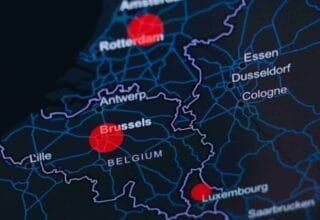

The travel industry could stand to benefit greatly from the continued development of decentralized identifiers (DIDs), including decentralized identifier communications (DIDComm). Benefits include easier communication with customers, removing the need for antiquated username/password systems, and simplified tracking of luggage, among a “big wave” of other use cases.
Washington Post: Biden’s coronavirus testing push will need to face the ghost of websites past
The swift spread of the omicron variant has laid bare the dearth of coronavirus tests nationwide, prompting President Biden last month to announce plans to make 500 million rapid tests available in part through a new federal website where citizens can sign up to receive them.
NBC News: Demand grows for digital vaccine passports as borders reopen
In the week since international travelers were welcomed back to the United States, airlines, nonprofit organizations and travel groups have finally seen an uptick in the digital health passes they had hoped travelers would use since their launch.
MIT Technology Review: Is the UK’s pingdemic good or bad? Yes.
Oscar Maung-Haley, 24, was working a part-time job in a bar in Manchester, England, when his phone pinged. It was the UK’s NHS Test and Trace app letting him know he’d potentially been exposed to covid-19 and needed to self-isolate. The news immediately caused problems. “It was a mad dash around the venue to show my manager and say I had to go,” he says.
Digital health pass developments worldwide: Canada, Slovenia, Linux Foundation
In many different formats and under many different names, digital health pass systems to prove a person’s COVID-19 status are being developed around the world. They can show how many vaccination doses the holder has received and when, whether they have a recent negative PCR test or have recovered from the illness.
We investigated whether digital contact tracing actually worked in the US
In the spring of 2020, the first versions of covid-19 exposure notification systems were released to the public. These systems promised to slow the disease’s spread by providing automated warnings to people who came into contact with the virus. Now, over a year later, residents in over 50 countries—including half of US states—can opt into these systems.
What Are the Roadblocks to a ‘Vaccine Passport’?
With all American adults now eligible for Covid-19 vaccines and businesses and international borders reopening, a fierce debate has kicked off across the United States over whether a digital health certificate (often and somewhat misleadingly called a “vaccine passport”) should be required to prove immunization status.
Linux Foundation Public Health creates the Global COVID Certificate Network
Linux Foundation Public Health (LFPH) announced a new collaborative network, the Global COVID Certificate Network, to facilitate the safe and free movement of individuals globally during the COVID pandemic. The new collaboration will establish a global trust registry network that enables interoperable and trustworthy exchanges of COVID certificates among countries for safe reopening and provide related technology and guidance for implementation. The effort is supported by industry leaders such as IBM who have implemented COVID certificate or pass systems for governments and industries.
What England’s new vaccine passport could mean for covid tech’s next act
Almost exactly a year ago, software developers rushed to build technologies that could help stop the pandemic. Back then, the focus was on apps that could track whether you’d been near someone with covid. Today the discussion is about digital vaccine credentials, often called “vaccine passports,” designed to work on your smartphone and show that you’ve been inoculated.
Vaccine Passports: What You Need to Know After Your COVID-19 Shot
You’ve likely heard that companies are now developing vaccine passports—also called immunity passports or vaccine certificates—to verify a person’s COVID-19 vaccination status, latest test result, or antibody test result. So you may soon be asked to scan a QR code on your smartphone to attend sporting events or concerts, cross borders, fly commercial airlines, and even enter a restaurant or your office building.